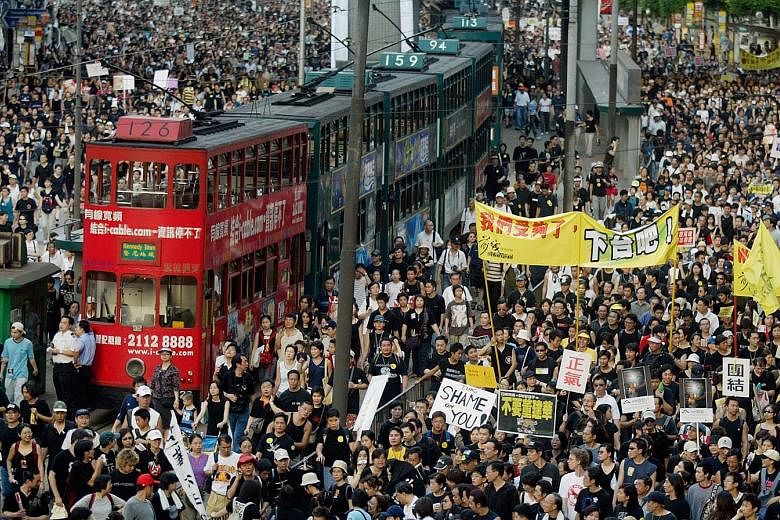HONG KONG • Hong Kong's landmark ban on a pro-independence party has reignited concerns that the government is pushing towards national security legislation that could be the death knell for the city's freedoms.
Article 23 of semi-autonomous Hong Kong's mini-Constitution, the Basic Law, says the city must enact national security laws to prohibit "treason, secession, sedition (and) subversion" against the Chinese government.
But the clause has never been implemented due to deeply held public fears that it would curtail Hong Kong's cherished rights, such as freedom of expression and the press.
Those liberties are unseen on the mainland and are protected by an agreement made before Britain handed Hong Kong back to China in 1997.
An attempt to implement Article 23 in 2003 was shelved after half a million people took to the streets in protest.
But 15 years later, it is back on the table, as an independence movement calling for the city to split from China incenses Beijing.
Monday's ban on the pro-independence Hong Kong National Party, on the grounds of national security and public safety, was made under the colonial-era Societies Ordinance and is the latest move in a campaign to muzzle pro-independence sentiment.
Activists have been banned from standing for office and disqualified from the legislature, while protest leaders have been prosecuted.
That growing repression is "introducing the definitions, transgressions, and punishments that are to become part of Hong Kong law", once national security legislation is brought in, said Dr Suzanne Pepper, an honorary fellow at the Chinese University of Hong Kong.
The introduction of Article 23 is part of Beijing's strengthening campaign to suppress separatism in any of its territories and impose its definition of a "unified China", diluting the promises made to Hong Kong in the handover agreement, Dr Pepper told Agence France-Presse.
"Hong Kong is, step by step, learning that Beijing is attaching mainland definitions to all those rights and freedoms," she said.
Chinese officials are raising pressure for Article 23 to be enacted, and city leader Carrie Lam has stressed it is the government's "constitutional responsibility" to do so. But she has also said it will happen only when the time is right, implicitly acknowledging the backlash it may provoke.
Pro-Beijing lawmaker Felix Chung argues that it is better for Hong Kong to enact the legislation itself, rather than the Chinese government imposing its own national law on the city.
Pro-China moderates have proposed combining the legislation with promised political reform to appease the pro-democracy camp.
But Mr Chung believes Beijing is unlikely to go for that.
"From the perspective of the central government, national security cannot be compromised," he said.
Hong Kong Journalists Association chairman Chris Yeung said he was concerned the legislation would be "deliberately vague and ambivalent" to make it easier to prosecute political targets.
Mr Yeung believes the more insecure the Chinese government feels, the harder it will tighten its grip.
A "paper tiger" is no longer enough for the authorities, said Mr Yeung. "Now they want a real tiger that bites."

